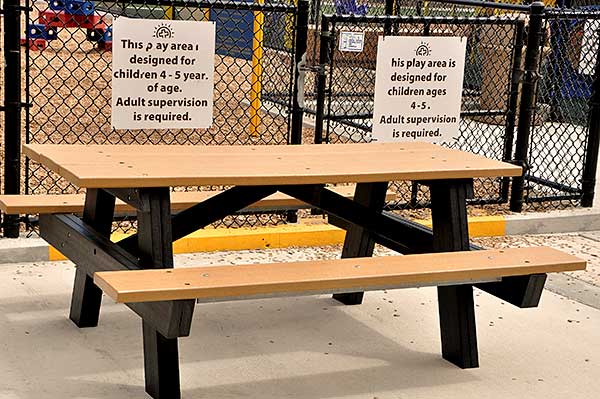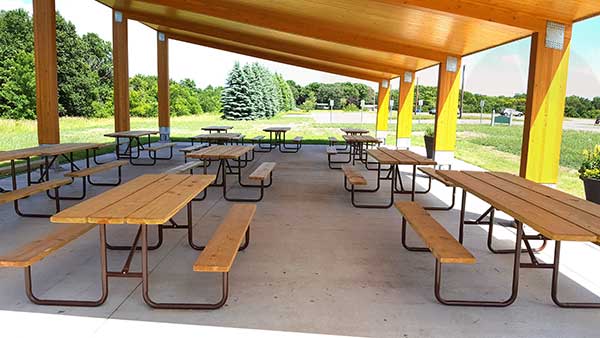 In a study commissioned by the EPA, it was determined that using plastic picnic tables and other plastic lumber is a recommended way to "green" a landscape product
In a study commissioned by the EPA, it was determined that using plastic picnic tables and other plastic lumber is a recommended way to "green" a landscape product
It's an ongoing argument - buy traditional outdoor furniture such as wooden picnic tables for less or pay more for plastic picnic tables and save later on maintenance costs.
Both products have their plusses.
But in several studies conducted by the Environmental Protection Agency, researchers found several compelling reasons to use plastic picnic tables and plastic lumber as a "greener" and smarter alternative to wood.
Plastic picnic tables save resources and create jobs
Here are some of their arguments:
1. Variety - Recycled plastic scrap is now being manufactured into a wide variety of landscaping products and not just for plastic picnic tables or recycled plastic benches. Those other uses include guardrails, posts, bollards, parking stops, speed bumps, signage, barricades, fences, retaining walls, decking, gazebos, boardwalks, commercial trash cans, messages boards and many others.
A park or facility now has many "green" applications they can incorporate into their landscape projects.
2. Recycling - this is one of the main benefits of reusing milk jugs, juice containers, laundry detergent containers and other HDPE classified high-density polyethylene products. One plastic picnic table recycles the plastic from 2,000 discarded milk jugs.
This completes the critical, planet-saving loop illustrated in the popular recycling symbol with the three arrows - Collect - Manufacture - Reuse. What good is putting all that plastic in those recycling bins if the scrap isn't made into new products that are redistributed?
3. Landfill Reduction - as you can imagine as the Earth's population increases, so does the garbage that humans generate. But there is only so much land available for landfills. In addition, the further away a landfill is located from an urban area, the more pollution that is created transporting the solid waste. Steering plastic products away from landfills and into factories for reuse is an ideal solution to this problem. Imagine the space that a pile of 2,000 milk jugs would take up.
4. Jobs - rather than throw those empty milk jugs and laundry detergent containers away, gather them and put them in the hands of workers to make plastic picnic tables, recycled plastic benches, signs, planks, speed bumps, etc. The recycling industry today employs hundreds of thousands of people. According to the EPA's 2016 Recycling Economic Information report back in 2007 there were 757,000 in the recycling industry. Those jobs generated $36.6 billion in wages and $6.7 billion in tax revenue. That figure is probably double today. Reusing products creates 30 times more jobs than landfills do. In addition, it is estimated that if the US had a recycling rate of 75% by 2030, it would create more than 1 million new jobs.
5. Advances in Quality - in the early days, the quality of many recycled plastic products was disappointing and certainly did not seem to be a practical alternative to wood. In addition, some manufacturers would make substandard plastic products using filler such as sawdust.
However, recycling technology has made incredible advances in the past decade. The products created by reputable manufacturers are now superior in quality. The plastic planks they produce are strong, durable, weatherproof, resistant to UV rays and don't crack, warp, splinter or rot. Perfect for outdoor commercial furniture that is exposed to the elements every day of the year.
 Wooden picnic tables have traditional appeal and blend in well with outdoor settings. Covering them from the elements will add years to their life-span as well
Wooden picnic tables have traditional appeal and blend in well with outdoor settings. Covering them from the elements will add years to their life-span as well
Wooden picnic tables - looks versus care
6. Wood Is A Renewable Product - Here's a big advantage for wood. Plant some seeds and you create more wooden planks. Although, it does take a few years for a tree to grow. And today, there are many "forest plantations" where trees are harvested instead of cutting them in natural forests. However, the wood planks from those plantations tend to be weaker and not as straight as planks from natural woodlands.
7. Forests Provide Valuable Habitat - there aren't too many animals that might call a landfill their home but trees do provide habitat for an incredible number of species. An estimated 1,500 to 2,100 species live in virgin forests. The EPA reports for every four tons of trees that are saved, one acre of habitat is created. In essence, for every ton of trees you don't cut down, you also preserve homes for deer, squirrels, rabbits, birds and other creatures.
8. Wood Deteriorates - the fibers in wood are not made to last a long time. The sun, rain, snow, ice and cold will damage those fibers quickly. In addition, insects, mold and mildew can work their way into the wood causing further damage. With plastic picnic tables, for example, there is no rot, mold or infestation. Wooden picnic tables will generally last around 10 years before the slats have to be replaced. Plastic picnic tables last much longer.
9. Maintenance Costs - a wooden picnic table may be much cheaper than a plastic picnic table. But a wooden picnic table requires care, a plastic picnic table does not. Just about every year those wooden planks need to be sanded and repainted. That's not the case with plastic picnic tables. In fact, with advancements in polymer technology, those picnic tables now have plastic planks that will not fade over the years. So even under a brutal sun, the appearance will remain the same or close to the original color.
10. More Variety of Colors - that's another advantage of plastic picnic tables - the color choices. The basic choices are cedar, green and gray but more colors are coming on the market. The planks are also made with a grainy texture so they resemble wood. (If you are really looking for color choices and a long-lasting product, consider metal picnic tables. Thermoplastic metal picnic tables now come in a large variety of styles and colors and the coatings are fade-resistant, rust-proof and highly durable as well).
11. Vandal-proof - a wooden picnic table in an outdoor setting surrounded by grass and trees is always a pleasing sight for visitors. But sometimes when they walk up to the table they find offensive graffiti carved into the wood. Unfortunately, this takes place all too often.
When that happens, park and facility managers have to scramble to quickly remove the table from the grounds or get a maintenance worker over there right away to sand and refinish the surface. Graffiti is not an issue with plastic picnic tables. The writing can be quickly removed with industrial cleaners, pressure washing or sometime just soap and water.
12. Price Comparison - a standard six-foot A-frame plastic picnic table today is listed for $872 on The Park and Facilities Catalog website. An equivalent six-foot wooden picnic table sells for $377.
However, in a study conducted by the EPA, here's how they calculated the true costs after five years.
For an 800-square-foot deck the initial costs were:
Plastic lumber - $4,400
Pressure treated lumber - $2890
Cedar - $3990.
After five years when you add in maintenance costs:
Plastic lumber - $4,400
Pressure treated lumber - $5,390 (increase of $990)
Cedar - $6,490 (increase of $2,090)
The same ratios can be roughly applied to site furnishings such as plastic picnic tables, plastic benches, signs, barriers, boardwalks, message centers, etc.
"I certainly don't condemn the use of treated wood," wrote a columnist for the Sierra Club magazine. "Harvesting timber is not an inherently bad thing. It can be done in an environmentally sustainable way. But I would still give a nod to recycled lumber for the maintenance and material that would have been wasted."
The EPA report stated: "Plastic lumber, a product made from recycled plastic, is ideal for use in landscaping applications. By using plastic lumber, landscapers can create cost-effective, high quality, and environmentally beneficial projects."
Wooden picnic tables are a beautiful addition to any landscape. But if you want to add a "green" element to your project, the verdict is in. Right from the EPA's mouth. With recycled products such as plastic picnic tables, you will not only save money in the long run, but you will also be saving the planet from wasting resources and running out of landfill space.


